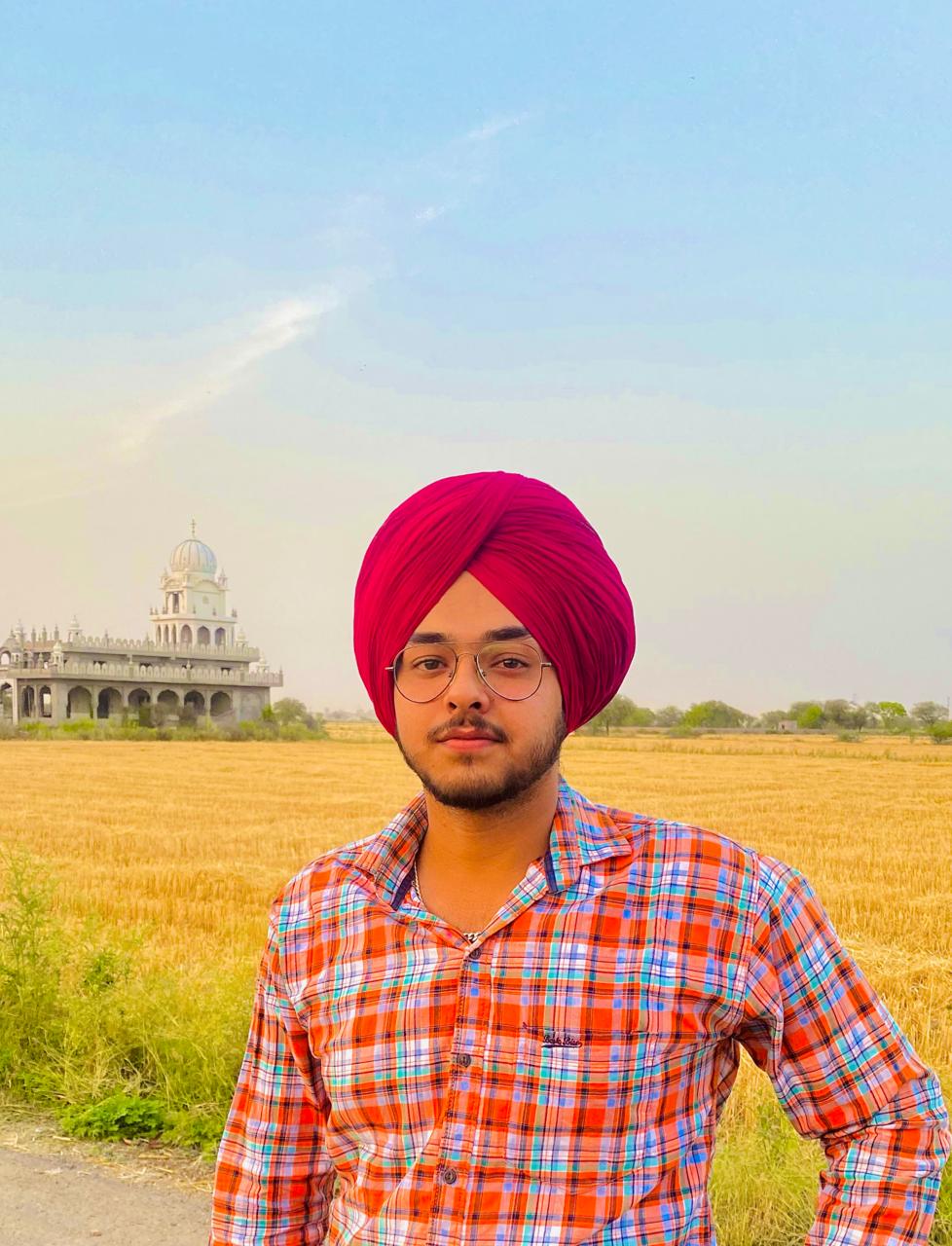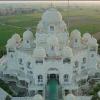Search the Community
Showing results for tags 'punjabi'.
-
Learning punjabi and wanted to know which punjabi kathvachaks speak in an easily understandable punjabi which will help me
-
I am curious to know what would one call their father's mama in Punjabi? Also what would one call their father's Nana?
-
ਵਾਹਿਗਰੂ ਜੀ ਕਾ ਖਾਲਸਾ ਵਾਹਿਗੁਰੂ ਜੀ ਕੀ ਫਤਹਿ। ਕੀ ਕੋਈ ਵੀਰ ਭਰਾ ਦੱਸ ਸਕਦਾ ਹੈ ਕਿ Pyre ਜੋ ਕਿ ਮੌਤ ਤੋਂ ਬਾਅਦ ਅੱਗ ਲਗਾਕੇ ਸ਼ਰੀਰ ਸਾੜਨ ਨੂੰ ਕਹਿੰਦੇ ਨੇ। ਇਸਨੂੰ ਪੰਜਾਬੀ ਵਿਚ ਸਸਕਾਰ ਕਹਿੰਦੇ ਨੇ ਯਾ ਸੰਸਕਾਰ? ਕਿਉਕਿ ਸੰਸਕਾਰ ਨੂੰ ਇੰਗਲਿਸ਼ ਵਿੱਚ Manners ਕਹਿੰਦੇ ਨੇ। ਕਿਰਪਾ ਕਰਕੇ ਇਹ confusion ਦੂਰ ਕੀਤੀ ਜਾਵੇ। ਧਨਵਾਦ।
-
WJKK, WJKF to all - new to the forum but sharing a link to a Punjabi version of Wordle. It may be interesting for any Punjabi readers hoping to practice. You can see people playing it on Twitter. I am no expert so please feel free to send any feedback along. Bhul chuk maaf, thank you!
-
Hi, everyone. Can you share what your stereotypes are about Sikh girls? The good, the bad, the ugly? For example: Indian girls (in general) are stereotyped as hairy, prudish, nerds, get fat after 1-2 kids, really smart (even the dumb ones), not as attractive as other ethnicities, loyal, good cooks. What do men here personally stereotype Sikh women as from your experiences with them? I'd like to know even if it hurts, thanks.
- 34 replies
-
0
-
- punjabi girls
- sikh women
-
(and 2 more)
Tagged with:
-
Every person shud hv love for his mother tongue. I hv great love for my mother tongue punjabi but we can't say that Punjabi is sikhi and sikhi is Punjabi. That's what daler Kaur Khalsa said and it hurt some haryanvi jaats who hv become Sikhs. Jaats want to become Sikhs but they want to preserve and protect their mother tongue haryanvi. They told me that they would like to learn Punjabi as lots of sikh literature is in Punjabi but they can't backstab haryanvi.
-
NOTE: This post is a work in progress Waheguru Ji Ka Khalsa, Waheguru Ji Ki Fateh! Often times I hear Non-Sikhs bring up common arguments against Sikhi, and as someone who likes to create a lot online resource hubs for Sikhs, I am taking it upon myself to create a list of Q/A's. I recently got a series of arguments (posing as questions) from an anonymous user on the Sikh Reddit who was allegedly Ex-Sikh. He frequently made references to Islam, and also claimed that he had done a lot of research on his "questions", yet the questions themselves seem as if they are taken from wikipedia or some anti-sikh site. Here are some of the arguments I would like to debunk: Q: If Sikhi is against the Caste System, then why are their Caste based Gurdwara's? A: Anyone can just create a "Gurdwara" and install their own beliefs into it, that doesn't make it valid. The key part here is that this cannot be supported by the actual theology of Sikhi, and all the main Gurdwara's still allow people of lower-caste to enter. All of these so called "caste Gurdwara's" are also not backed by the Akal Takth, and are not recognized by the Khalsa Panth. Q: Why were the Gurus themselves all from the Khatri caste and married within their own caste despite preaching against such barriers? A: The very premise of this question is incorrect, Guru isnt from the Khatri caste becuase the concept of caste itself is invalid. There is no evidence to suggest that caste was involved in the marrage decision, and neither was any proposal rejected due to caste. Furthermore, the Siri Guru Granth Sahib Ji itself contains writings from people of different "castes" and backgrounds. When the Guru created the Khalsa Panth, the Panj Pyare were from different occupations, locations, and families, the entire concept of the Khalsa itself destroys the caste system. If the Guru was secretly supporting the caste sustem, he would have not created the Khalsa and passed on the Guruship. Gurbani itself is the Guru, and its anti-caste message is very clear, but it's some food for thought. Q: How about the succession of the Gurus? How do we go from the 4 first being chosen by merit and from different lineage, then suddenly it turns into a system of monarchy resulting in the succession of Guru Harkrishan Ji at such a young age who also passed away at a young age. A: "Nepotism" is defined as: The practice among those with power or influence of favoring relatives or friends, especially by giving them jobs. A lot of people like to accuse the Guru of being Nepotistic, and use it to bring down Sikhi by stating the successors of the Guru were not truly worthy of the title. The next Guru was never chosen on the basis of nepotism, and was always chosen based on Merit, the Guru tested each of his followers to see if they were worthy of the title of Guru. We are all just vessels filled with the same light, "family" is an illusion, we are all One. Although some of the Gurus did pass the Guruship on to their human sons, many did not, and even if they did, it was becuase their sons just happened to pass the test.If Sikhi allowed Nepotism, then why didnt Guru Nanak Dev Ji or many of the other Guru's pass it on to their children? Guru Nanak could have easily made Sri chand or Lakhmi Das the next Guru, the same applies with Guru Gobind Singh ji who did not have to let any of his sons sacrifice themselves for Sikhi, and could have asked them to not give Shaheedi. The fact that Guru Gobind Singh Ji established the Khalsa in 1699 before the death of all his human offsprings shows that he was going to stop the line of Human Guru's anyways. The ultimate argument against nepotism in Sikhi is the fact that the Siri Guru Granth Sahib Ji & the Khalsa Panth were made the eternal Guru. Hypothetically, even if the Guruship was passed down based solely on Nepotism, I would have no problem with it becuase it is the Guru's decision and looking back at history and how each Guru lives his life, I can say the Guru made the perfect decision. As for Guru Harkrishan Ji, the reason the Guru chose the vessel of a young boy was to show that spirituality isnt affected by age, and even a child can attain liberation. The reason Guru Harkrishan Ji physically passed away at such a young age was to exemplify shaheedi, it makes no sense for the Guru to go around curing other people of small pox, yet die from it himself. Q: why has Sikhi remained confined for the most part to the Punjabi population? A: Sikhs dont go out and actively convert people like people of Abrahamic theologies do, the Sikh community is also generally very young compared to others. This issue is already starting to change, there are already hubs of non-punjabi Sikhs thriving in places like America, Indonisia, UK, Canada, etc, and we just need time. Q: Why did/are some Sikhs converting to other religions, if Sikhi is supreme, then why would people leave it? A: The message itself is supreme, but the people themselves are not. The argument of people leaving/joining a certain religion can be made for any group. The larger abrehamic religions are the ones that generally have a higher turnover rate compared to easter Dharams. Q: why hasn’t history seen Gurus with a similar message in the West or other corners of the world? A: There are other people with similar messages, there's even some new relgion in the west called "Eckankar" which is very similar to Sikhi on certain aspects. Gurbani also contains Bani from a lot of people who lived before the physical arrival of Guru Nanak Dev Ji, who's Bani is inline with Gurmat. Q: Why is Gurbani repetitive? A: I dont know if your reading the english translation or something, but in Gurmukhi the way certain words are used has a different meaning depending on the context. Furthermore, Gurbani is also multilayered, and speaks to the mind during its different states. As for repetitiveness in message, it's important becuase Humans learn from repetition, when you were a child, your parents had to constantly call you by your name so you remember it, etc. Gurbani is not like the abrehamic texts, it is not divided by chapters, but rather by Music. Gurbani does not have dedicated sections for certain topics, becuase as a Sikh our job is not to pick and choose what we want to learn, the Guru teaches us what we need, and the format Gurbani is written in ensures its multi layered and speaks to different people at different stages in their spiritual journey. The fact that there are other Bhagats whose Bani is inline with the Guru, reinforces the Oneness of the message of Sikhi. Q: Why did the Gurus have multiple wives? At least with Islam there is a specific guidelines prescribed, a lot of Sikhs like to argue based on emotion rather than historical evidence. A: The narrative that the Gurus were polygamists is highly contestable on the basis of historical analysis, not emotion. "The story of Guru Har Rai having married seven wives, who were all sisters, is found only in one MS of Suraj Prakash and is written on unpaged leaves which are clearly an interpolation. Unfortunately this copy became the basis of the editions nowadays in vogue. Other copies mention only one marriage. Mahima Prakash, which is much older than this book, also mentions only one wife. See on this point the annotation of Bhai Vir Singh on Suraj Prakash" -Dr. Ganda Singh, Baba Teja Singh; 'A Short History of the Sikhs,' vol. i, pg. 48. Here is a good post discussing this issue As for Islam, providing specific guidelines, I hope you realize that it also provides guidelines to beat ones wife, among many other things... Q: Why so much debate over a simple matter of canon scriptures (the Dasam Granth which oddly enough contains 2 of the prayers forming the Nitnem) A: There isnt "so much" debate over this. the Anti-Dasam granth crowd is a vocal minority, and the Dasam Granth is accepted by the Khalsa Panth as a whole, and even backed by the Akal Takth. Furthermore, the Debate that does happen isnt about the nitnem banis from Dasam Granth (Jaap Sahib, Tav Prasad Savaiye, Chaupai Sahib). Overall, Sikhs have still preserved their scriptures far better than many others, and the Quran itself was never even written down by Muhammad, Jesus never wrote the Bible, etc... Q: Why is there such a controversy over vegetarianism vs meat eating? Why didnt the Guru lay our a clear guideline? A: This wasn't really an issue before the start of the modern day meat industry, but we as a community have turned it into an issue. Sikhs historically ate meat, this is a fact, the reason there is a big vegetarian movement in the Sikh community is mainly due to the modern day meat industry and the idea that Sikhs dont really need meat anymore becuase they have so many more alternatives. As for the actual theology regarding this issue, its already clearly laid out by the Guru: Sikhs are to refrain from Halal Meat, if a Sikhs is to hunt or eat meat, then they must follow the Jhatka Maryada set up by the Guru. More information and sources can be found at jhatkamaryada.com Q: Why are Sikhs encouraged to be critical thinkers, yet told not to ask questions? A: People are getting two concepts confused: its ok to question the Guru similar to how a student questions a teacher, however its discouraged to question for the sake of trying to create an arguement or disruption. Final Thoughts A deep underlying issue that motivates a lot of these arguments is the idea that if Sikhi is true, then why would it not also temporally reign supreme, and why would "bad things" happen to Sikhs if they are morally correct? The answer to this is the simply: Hukam, and the fact that "good" and "bad" dont really exist. However, the issue here is that others will see this as a cop out. I am interested in developing a more indepth response to this strain of thought. Any recommendations? Feedback If you have any suggestions, please let me know any way you can, you can also email me at TheTurbanatore@gmail.com or contact me via Reddit at reddit.com/u/TheTurbanatore
- 4 replies
-
6
-
- punjabi
- criticisms
- (and 11 more)
-
This video illustrates notable female personalities across the globe where assorted topics are mentioned ranging from politics, career-paths, science, philosophy of Sikh heritage from a countless angles and breadth and depth. https://www.youtube.com/watch?v=husNH4RW-gQ Thank you. Best Wishes Guest MamTha3890
-
I just wanted to make my first post here because this has been playing on my mind for a while now. I feel like Sikhi Kirtan does not have the same passion I hear from other religious musical pieces, and as a result its not inspiring young people. I feel like the popular Kirtans are easy, dull, follows Bollywood/punjabi tunes and therefore lacks originality/identity/spiritualism. I have been listening to Islamic sufi music, Christian hymns and Hindu Kirtans - which I find all sound different and beautiful in their own way. With Sufi music drawing me in the most - even Bollywood adaptations like 'Kun Faya Kun' sound beautiful. With young people, I don't expect Kirtan to modernise, it doesn't need to. Indian Classical Music is and will always remain timeless, if played with passion, dedication and training, then you can draw in anyone no matter where you live. This is why Ravi Shankar and Nusrat Fateh Ali Khan broke internal barriers. Unfortunately most of the kirtan tunes these days sound like outdated Indian/punjabi pop music It doesn't help that only Sikhs can play kirtans in many Gurdwaras around the world. Collaboration inspires creativity - isn't that was sikhism was about? Openness to all? Here is a kirtan I think is nicely composed - https://www.youtube.com/watch?v=UHJtedXR5v4
-
ਵਾਹਿਗੁਰੂਜੀਕਾਖਾਲਸਾਵਾਹਿਗੁਰੂਜੀਕੀਫ਼ਤਹਿ! We would like to invite the sangat to the official ‘GyanKhand’ Discord Server. Like our Instagram page, Subreddit, and Soundcloud, YouTube, and other platforms, our aim with this platform is to further extend the reach of our content so we can spread and raise awareness of the ancient knowledge passed down by our Gurus, warriors, saints, and scholars. This server is yet another part of our everlasting endeavour to create a large online community for Sikhs; not just one where educated Sikhs can have intellectual discussions, but also a place which those who are interested in learning more about Sikhi can rely on. Furthermore, this server acts as the ideal online hub to learn about Puratan Granths [pre-colonial literature] and Sikh literacy as a whole. This server also offers a ‘Kirtan’ channel where one can engross themselves in heart-warming Puratan Keertan, a ‘Katha’ channel where one can attain the extensive knowledge of the most learned Gianis and Vidvaans, a channel dedicated to sharing and discussing Puratan art/symbology, and many other accommodations. All in all, the official ‘GyanKhand’ discord server is your ideal and fastest growing place to share, learn, and indulge in all things related to Sikhi. What we offer: 24/7 Live Kirtan 24/7 Live Katha 24/7 Live Gurbani Gurbani Santhya Learn Gurmukhi & Punjabi Events with various Parchariks Literature Discussions Support groups Book Clubs Watch others do live Kirtan Hope you join us! Link: https://discord.gg/PwmmkuX6Nd
-
Waheguru Ji Ka Khalsa, Waheguru Ji Ki Fateh! A Basic Rundown of Vaisakhi Vaisakhi is a dharmic, and cultural festival which is celebrated on the 13th or 14th of April every year. For Sikhs, it commemorates the formation of Khalsa Panth, for Punjabi's it marks the beginning of the harvest season. The celebration of Vaisakhi predates Sikhi itself, however after the formalization of the Khalsa in 1699 it was mainly celebrated as a religious event for Sikhs. A lot of people might not realize this, but Guru Nanak Dev Ji was also born on Vaisakhi 1469 (Wikipedia is wrong), the same day Guru Gobind Singh Ji, the 10th Human form of Nanak, decided to lay down the formalization for the Khalsa Panth. This fact is often forgotten, but it amplifies the importance of Vaisakhi for Sikhs, as not just a celebration for the creation of the Khalsa, but also the day Guru Nanak Dev Ji was born. The Truth about Vaisakhi Vaisakhi used to be a Punjabi new years harvest festival, and was transformed by Guru Gobind Singh Ji to celebrate the creation of the Khalsa, but modern day Vaisakhi has mostly devolved from a celebration of the Khalsa back into a Punjabi festival. Vaisakhi for Sikhs isnt about Bhangra dancing, colorful cloths, or free food, it's about celebrating the creation of the Khalsa Panth. When I ask non-sikhs, and even some sikhs about Vaisakhi, they seem to be clueless as to why we celebrate it in the first place, and instead make it about free food or socializing with friends. We attend all these Nagar Kirtan parades and we eat food and meet friends, but at the end of the day we dont end up learning anything about Sikhi. Sadly, Vaisakhi also gets hijacked by corporations trying to promote their business, and Politicians trying to promote their party. This is bad becuase their are taking advantage of such an important occasion, however isn't that bad becuase these corporations and politicians also contribute a lot of funds to organizing Vaisakhi, help spread awareness, and participate in it themselves to attract even more people. I think we should find a way to limit them, if not cut them out completely. We are not responsible for promoting another culture at a Sikh event, especially when they are using Gurdwara money, on Gurdwara property, under the name of a Sikh event. Punjabi culture itself is often times anti Sikh as it promotes alcohol, sexism, caste system, etc. If we allow any of it, then we risk mixing it and passing it off as Sikhi to the rest of the world. This will create a lot of problems becuase people will be fed misinformation that will be the direct result of Sikhi being watered down by Punjabi culture. Now before you get triggered and start calling me a radical, fundamentalist, zealot, extremist or any of the buzzwords people like to use, just keep in mind that I am a freedom of speech and expression advocate, and I dont feel like we should outright ban Bhangra, Punjabi Music, or food. I definitely feel like their are a lot of people who come to Vaisakhi just for the food, music, dancing, etc, and to ban the aforementioned practices would cut off a lot of people who could be potentially educated on Sikhi. Instead of having a complete blanket Ban like some Sikhs propose, I think that we should try to somehow limit the Punjabi culture and push back hard and find a way to bring the focus on Vaisakhi back to Sikhi instead of Punjabi culture. Typical Punjabi "Counterarguments" When I bring up the issue of the Punjabiization of Vaisakhi, I often times hear the same pathetic counterarguments from Punjabis who try to defend the Punjabification of Vaisakhi. I will now address some of these common "counterarguments" that Punjabis bring up in defense of the current state of Vaisakhi. One common argument Punjabis like to bring up is "oh but most people who attend Vaisakhi are already Sikh, why do you have to promote relgion so much?", that might be true, but keep in mind that most people are only Sikh in name, and when confronted, they know very little about Sikhi, or just know misinformation. When I personally do parchaar and hand out the "3 Facts about Sikhi" leaflets at Vaisakhi, a lot of Punjabi "Sikhs" reject my lefts saying something along the lines of "were already Sikh,we know about Sikh-ism, just focus on the white people, not us", however when I ask them to explain the basic principles they fail miserably and then finally bend the knee and accept the leaflet. Another common argument is "oh but Vaisakhi existed before Sikhi, and was celebrated by farmers as a new year's/harvest festival, you can't just hijack it", it's true that Vaisakhi and was celebrated as a new year's/harvest festival prior to Sikhi, however Sikhs celebrate it becuase of the creation of the Khalsa, and that is what really popularized Vaisakhi, and is what it's known for today. How many people, especially Sikhs in the west, honestly celebrate Vaisakhi as a harvest festival? Most of us aren't even farmers, without Sikhi, Vaisakhi would be all but irrelevant in the modern age. If someone wants to celebrate Vaisakhi as a harvest festival, then they are free to do so and we aren't stopping them, however we as Sikhs must remember that we celebrate Vaisakhi as the creation of the Khalsa. Make Vaisakhi Great Again At the moment Vaisakhi is nothing more than a Punjabi festival with a Sikhi twist, we need to reverse that. I propose that we start by increasing all efforts to do parchar and educate the community on Sikhi. Vaisakhi attracts hundreds of thousands of people, all of whom have the potential to be educated. This is a golden opportunity that only comes once a year, and we as a Panth need to capitalize on it if we are to grow Sikhi. What better place and time to spread Sikhi than at a Nagar Kirtan during Vaisakhi time. It honestly says a lot about the Sikh community when very few "Sikhs" are educated on it, and even fewer are fully committed to the faith. I feel like we need to really focus on our community, and not sideline them in favor of non-sikhs, becuase at the end of the day these are the people who identify as Sikh and still practice some form of Sikhi, even tho it is a watered down, and heavily Punjabiized version. Punjabi culture is like a double edged sword, it promotes anti-sikh practices, however it also promotes pride & bravery to defend ones way of life. When things get serious, Punjabi's are often the first one to go fight on the frontlines. During 1984 many non Amritdhari Punjabis, who were otherwise never religious and would never wake up for Amritvela, joined the fight and died fighting in defense of Harmandir Sahib. The thing about Punjabi's is that they are always ready to die for the Panth, but aren't willing to live for the Panth. I feel like Punjabis have a place in the Sikh community becuase without them we wouldn't get very far. We need to take the good things about Punjabi culture and leave the bad, this is why I dont feel like Punjabis are a lost cause and are worth doing Parchaar to. What I propose is that we drastically increase our education efforts. This can be done in the form of educational events, school programs, university courses, and most importantly: street parchaar. We must also compare and contrast between Sikhi and Punjabism in order to separate them, and demonstrate Sikhi's obvious superiority. Instead of a straight up ban, I would suggest we specifically stop Music that contains anti Sikh themes that promote drugs, alcohol, degrading women, etc at Sikh associated events and Gurdwaras. If someone wants to go around blasting anti Sikh music then by all means go ahead, but not at a Sikh event. As for bhangra, although it does not represent Sikhi, if someone wants to dance to celebrate the creation of the Khalsa then I think it's fine. If we follow through with the aforementioned strategies, we can still keep the Punjabis happy, all while promoting Sikhi! My Question for the Community What would you improve or change for Vaisakhi to make it focus more on sikhi, rather than Punjabi culture? Please leave your suggestions down below. Resources Informative Leaflets RajoanaTV Exposing the Culturalization of Vaisakhi Nanak Naam on why Sikhs celebrate Vaisakhi, & its significance Basics of Sikhi on The Unique Khalsa Panth! Vaisakhi Katha
-
This applies to Punjabi’s too. why is lying compulsively and being dishonest and integral part of our culture. We consistently lie about everything from the trivial little lies to big white lies. The whole indoctrination of being “tej” from the other person by our parents, only a nicer way of saying how we should strive to be so dishonest and deceptive to get our “matlab” from someone rather than creating some actual value and having something good to offer. I came to Canada as an international student and just as any other student I’m currently on my work permit and at a mercy of a crooked employer for my PR, and being bled dry for it. He’s a “sayana” for which I thought he’d be not be as bad, but is crooked to the core. Its been driving me nuts and giving me really bad anxiety. I’ve met many monays, gursikhs, hindus, and I’ve seen that behavior listed above manifest in every single one of them. I’ve yet to come across a single person who I can say could be a good role model. From what I’ve seen, here are the stereotypes I’ve formed regarding people in our diaspora: punjabi: tend to be overt in exploitation, don’t hide it at all. Lie to your face. Know they can do it and get away with it. I rented a room with this guy from which I had to leave half way through the month cause apparently the Punjabi family that lived there didn’t own the house and they didn’t tell me that and the true owners didn’t approve of me staying there, I paid rent in full and since I had leave half way through the month when the real owners found out so I asked for the half back and I didn’t get it. Typical “de dangey” everytime for months until I gave up. gujaratis: worst of them all, very cunning and the absolute true consmen. They can’t get enough of playing stupid little games. Telling others people stuff to others, and just causing unnecessary drama all the <banned word filter activated> time. Literally, they don’t get tired of it. That’s where the “scammer indian” stereotype comes from I guess. I’d like to know what’s all y’all opinion about what I just shared. Where do y’all think we went wrong? How did it all started and our values deteriorated and we landed ourselves in the mess that we are in. especially for us sikhs, where our gurus have set countless examples through their actions as to how to maintain integrity and manifest a strong moral fiber in the face of a torturous death. thank you for reading. also, when I mention Punjabi’s I’m referring to both sikh and Hindus.
-
Waheguru Ji Ka Khalsa, Waheguru Ji Ki Fateh. I thought as a positive, informative post, lets share punjabi food recipes and channels to help educate the youth on our beautiful cuisines and dishes. One good channel I found was Punjabi Veg Recipes: https://www.youtube.com/channel/UC-ND4aBWR5mlYxxZVBZm7fA Below are some of the recipes we've tried and taste nice: Roti (the essentials ? ) https://www.youtube.com/embed/gOZb1LGO9cQ Curry: https://www.youtube.com/embed/AKPdjnt6_Go Barfi (to wash it down with? ) https://www.youtube.com/embed/hDEdyskQScc
-
I was wondering is there anyone here who learnt to write punjabi on their own. I can read and speak well but can't write. I don't have a punjabi teacher. When I was a kid I used to go to punjabi class, but as an adult its hard to learn because you just don't know how to compared to my brothers who are coming from punjab. Like what type of exercises, stuff do you do. In the west punjabi is not a school subject. Please don't be generic. If there is anyone with experience that would be wonderful.
-
As most of you are probably aware of the recent protests against Gurdas Maan in Canada and now spreading to the Punjab. All of this because of Gurdas Maans controversial support of BJP’s vision for India to become a Hindi speaking nation. People are feeling betrayed, as for years Gurdas Maan was seen to be pushing for Punjabiat through his songs and accumulated vast wealth in the process, although some of us were already aware of the negative influence of his songs on the youth of Punjab. His association with KPS Gill (the butcher) is well known but this has not tarnished his Demi-God status. Could this be ‘the straw that finally broke the camels back’ and are the people of Punjab waking up to Indian Governments plans for further assimilation of Punjab into Hindi, Hindu, Hindustan?
- 33 replies
-
1
-
- hindi
- gurdas maan
-
(and 1 more)
Tagged with:
-
After waiting ages to take a DNA test, I finally got around to it recently. The results were, for the most part, what I expected. Here's my estimate: Asia - 85.4% South Asian - 79.9% West Asian (Iran, Afghanistan, Iraq, Caucasus, Turkey) - 4.3% Central Asian (Afghanistan, Tajikistan, Turkmenistan, Uzbekistan, Kazahkstan) - 1.4% Europe - 14.6% North and West Europe Irish, Scottish, and Welsh - 11.6% Scandinavian - 3.0% Even though these are only estimates, they give an idea of my ethnicity in a broad sense. Nonetheless 14.6% is still considered a fairly large proportion in an estimate, and in all honesty was completely unexpected. My knowledge on DNA and genealogy are probably basic at best but from what I've read such a large percentage of the European could be traced back as early as the 5th or 6th generation before me! This estimate didn't really tell me much as I would have liked to know so I decided to use GEDmatch to get a more in-depth picture. The results were certainly interesting (Jagsaw Singh if you're still around I'm sure you'll be the most pleased). For the sake of the topic I'll mention that I'm Punjabi Jatt. This is what I found out: Baloch - 37.94% (The term Baloch is used here to loosely describe Persian origin) South Indian - 29.43% (South Indian here refers to indigenous or native Indian) NE-Euro - 11.70% (oddly the Baltic region) Caucasian - 11.30% (Armenia, Georgia, Azerbaijan - again part of the Greater Persian Empire) SW-Asian - 2.28% (ambiguously referring to Persian, Caucasian, and Arabian) Mediterranean - 2.25% (most likely Greek, Cypriot, Turkish) The rest is negligible. You are also given an approximation how closely you are linked and compare to the individual populations of the sampling done by the genealogists, here are the top ten from highest to lowest: 1) Punjabi-Jatt-Sikh 2) Punjabi-Jatt-Muslim 3) Punjabi-Khatri 4) Pushtikar-Brahmin 5) Kashmiri-Pandit 6) Punjabi 7) Kashmiri 8) Punjabi-Brahmin 9) Rajasthani-Brahmin 10) Singapore-Indian What do you think? I was surprised at some of the detail it went into and some of it was actually expected - I have always explained to people how we very likely had Persian and possibly some European ancestors. Although I probably won't, personally I would love to lay claim to my Persian heritage! Has anybody here taken a test? What labels, if any, do I use now...Persian Jatt I think the moral here is we shouldn't be so narrow-minded.
-
Sat sri akaal koi advice dey sukda apni Punjabi kestra improve ho sakdi hai ? Menu punjabi parni , teh bolni aundai hai par oh gal nahi joh punjabich Palia. Mai punjabi parnch slow hai, tai jado bolda english di accent vi mix hondi hai. Punjabi vich gl ho jandi hai, par kul ke gaal nehi hundi, thora chukda bolnch, atai grammer da pura gyan nahi Jini punjabi aundai hai uh ta gharch bolke ja sun ke sikhi hai, par mai tait punjabi sikhna chaunda hai. how do you stop speaking in small sentences , and start having complex sentences, and a cast vocabulary? What can you do other then speak more Punjabi ( because I already speak Punjabi all day , but I know it’s not good compared to those born in Punjab)
-
vjk vjkf, Is there anyone here who is really really fluent in punjabi, like how they are in english. I can speak punjabi decently, but i still stutter sometimes, eat words, and sometimes break the flow of a conversation. I am not able to articulate my speech as I am in english ( and sometimes have difficulty expressing something because I don't know what words to use and how to construct that sentence in my mind) I wish to speak punjabi as I speak english, and let it be natural. How do you get there ? I can read in punjabi, but I am slower , and get tired of reading because it requires so much effort, also what do you do with vocab you don't get ? I want to speak punjabi well like my brothers born in Punjab.








